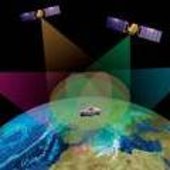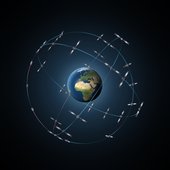http://www.esa.int/esl/ESA_in_your_country/Spain/Galileo_ya_disponible_para_el_mundo
Galileo, ya disponible para el mundo
15 diciembre 2016
El sistema europeo de navegación por satélite Galileo ha comenzado sus operaciones y sus satélites ya están en el espacio enviando información de posicionamiento, navegación y determinación de la hora a usuarios de todo el mundo.
La Comisión Europea, propietaria del sistema, ha anunciado hoy formalmente el comienzo de los servicios iniciales de Galileo, lo que constituye el primer paso hacia su operatividad total.
Nuevos lanzamientos seguirán ampliando la capacidad de la constelación, con lo que mejorarán tanto el rendimiento como la disponibilidad del sistema en todo el planeta.
La ESA ha supervisado el diseño y el despliegue de Galileo en nombre de la Comisión hasta que, el año que viene, ceda las operaciones del sistema y la provisión de servicios a la Agencia Europea del Sistema Global de Navegación por Satélite (GSA).
Tras cinco años de lanzamientos, actualmente hay 18 satélites en órbita. Los últimos cuatro, lanzados el mes pasado, están siendo sometidos a pruebas antes de unirse al resto de la constelación en la próxima primavera.
La constelación completa de Galileo estará formada por 24 satélites, además de los de reserva orbital, con el fin de evitar cualquier interrupción en el servicio.
“Para la ESA, este es un momento de gran importancia en el programa. Sabemos que el rendimiento del sistema es excelente”, afirma el director general de la ESA, Jan Woerner.
“Con el anuncio de los primeros servicios se reconoce que el esfuerzo, el tiempo y el dinero invertidos por la ESA y la Comisión han dado frutos, que el trabajo de nuestros ingenieros y el resto del personal ha merecido la pena, y que la industria europea puede estar orgullosa de haber creado este fantástico sistema”.
Por su parte, Paul Verhoef, director del Programa Galileo y de las Actividades de Navegación de la ESA, añade: “El anuncio de hoy marca la transición de un sistema de pruebas a un sistema operacional. Estamos orgullosos de participar en el programa Galileo”.
“No obstante, aún queda mucho por hacer. Es necesario desplegar la constelación entera, completar la infraestructura de tierra y probar y verificar el sistema en su totalidad.
“Además, hemos empezado a trabajar junto con la Comisión de cara a la segunda generación, en lo que muy probablemente será una larga pero gratificante aventura”.
Servicios iniciales
Galileo ya ofrece tres tipos de servicios, cuya disponibilidad irá mejorando con el tiempo:
El Servicio Abierto (OS) es un servicio general gratuito para usuarios equipados con receptores adecuados, como teléfonos inteligentes y sistemas de navegación para automóviles. Al ser totalmente compatible con GPS, su cobertura combinada ofrecerá un posicionamiento más preciso y fiable.
El Servicio Público Regulado (PRS) de Galileo es un servicio robusto y cifrado para usuarios con autorización gubernamental, como Protección Civil, bomberos o la policía.
Con el Servicio de Búsqueda y Salvamento (SAR), Europa contribuye al sistema internacional de señales de socorro Cospas-Sarsat, que lleva décadas en funcionamiento. Así, el tiempo desde que se ubica una señal de emergencia marítima o en campo abierto se verá reducido de un máximo de tres horas hasta tan solo 10 minutos, circunscribiéndose la ubicación a un radio de 5 km, en lugar de los 10 km anteriores.
Encuentra tu camino
Al igual que en el resto de sistemas de navegación por satélite, el funcionamiento de Galileo depende de la capacidad de medir el tiempo con una extrema precisión, de alrededor de 10 milmillonésimas de segundo de media.
Como todas las ondas electromagnéticas, incluyendo las de radio, viajan a una velocidad fija —de casi 30 cm por milmillonésima de segundo—, el tiempo que tardan las señales de Galileo en llegar al receptor de un usuario permite medir la distancia. Lo único que tiene que hacer el receptor es multiplicar la duración del trayecto por la velocidad de la luz.
Para localizar una posición debe haber un mínimo de cuatro satélites visibles: tres para determinar la latitud, la longitud y la altitud, respectivamente, y otro para garantizar la sincronización. Así, cuanto mayor sea el número de satélites disponibles, mayor será el nivel de cobertura y precisión.
El público comenzará a disfrutar de las ventajas de Galileo a medida que salgan al mercado dispositivos compatibles con el sistema: ya hay 17 empresas, lo que representa más del 95% del suministro mundial, produciendo chips compatibles con Galileo.
La ‘Hora del sistema Galileo’ está llamada a convertirse en una herramienta importante por méritos propios, esencial para sincronizar las redes de datos, energía y banca mundiales.
Galileo begins serving the globe
15 December 2016
Europe’s own Galileo satellite navigation system has begun operating, with the satellites in space delivering positioning, navigation and timing information to users around the globe.
Today, the European Commission, owner of the system, formally announced the start of Galileo Initial Services, the first step towards full operational capability.
Further launches will continue to build the satellite constellation, which will gradually improve the system performance and availability worldwide.
ESA has overseen the design and deployment of Galileo on behalf of the Commission, with system operations and service provision due to be entrusted to the European Global Navigation Satellite System Agency next year.
After five years of launches there are now 18 satellites in orbit. The most recent four, launched last month, are undergoing testing ahead of joining the constellation next spring.
The full Galileo constellation will consist of 24 satellites plus orbital spares, intended to prevent any interruption in service.
ESA Director general Jan Woerner noted, “For ESA, this is a very important moment in the proramme. We know that the performance of the system is excellent.
“The announcement of Initial Services is the recognition that the effort, time and money invested by ESA and the Commission has succeeded, that the work of our engineers and other staff has paid off, that European industry can be proud of having delivered this fantastic system.”
Paul Verhoef, ESA’s Director of the Galileo Programme and Navigation-related Activities, added, “Today’s announcement marks the transition from a test system to one that is operational. We are proud to be a partner in the Galileo programme.
“Still, much work remains to be done. The entire constellation needs to be deployed, the ground infrastructure needs to be completed and the overall system needs to be tested and verified.
“In addition, together with the Commission we have started work on the second generation, and this is likely to be a long but rewarding adventure.”
Initial Services
Galileo is now providing three service types, the availability of which will continue to be improved.
The Open Service is a free mass-market service for users with enabled chipsets in, for instance, smartphones and car navigation systems. Fully interoperable with GPS, combined coverage will deliver more accurate and reliable positioning for users.
Galileo’s Public Regulated Service is an encrypted, robust service for government-authorised users such as civil protection, fire brigades and the police.
The Search and Rescue Service is Europe’s contribution to the long-running Cospas–Sarsat international emergency beacon location. The time between someone locating a distress beacon when lost at sea or in the wilderness will be reduced from up to three hours to just 10 minutes, with its location determined to within 5 km, rather than the previous 10 km.
Finding your way
Like all satnav systems, Galileo operations rely on the extremely precise measurement of time – around 10 billionths of a second on average.
Because all electromagnetic waves, including radio, travel at a fixed speed – just under 30 cm each billionth of a second – the time it takes for Galileo signals to reach a user receiver yields distance measurements. All the receiver has to do is multiply the travel time by the speed of light.
A minimum of four satellites must be visible to pinpoint position: one each to fix latitude, longitude and altitude, with another to ensure synchronised timings. More satellites provide a greater level of service coverage and precision.
The public will begin benefiting as Galileo-capable devices enter the marketplace: 17 companies, representing more than 95% of global supply, now produce Galileo-ready chips.
‘Galileo System Time’ is set to become an important utility in its own right, essential for synchronising worldwide banking, power and data networks.
Related articles

Guillermo Gonzalo Sánchez Achutegui
ayabaca@gmail.com
ayabaca@hotmail.com
ayabaca@yahoo.com a vuelo
Inscríbete en el Foro del blog y participa : A Vuelo De Un Quinde - El Foro!





No hay comentarios:
Publicar un comentario